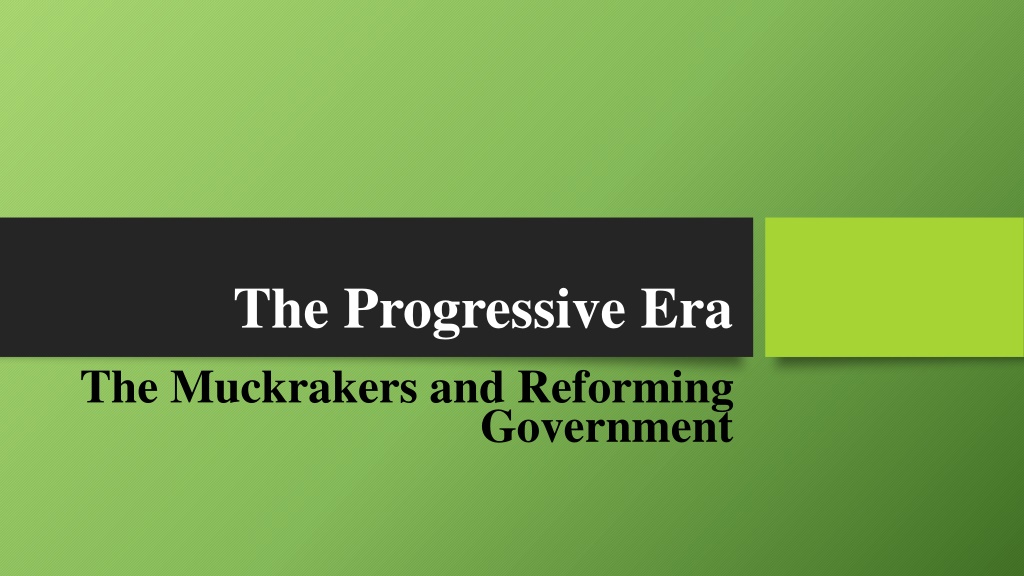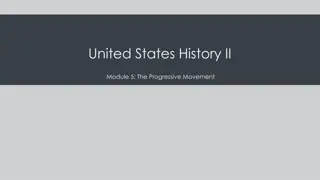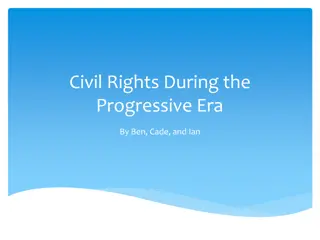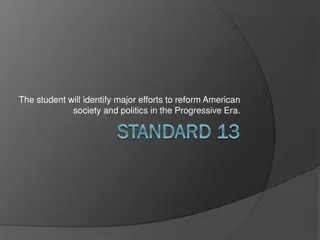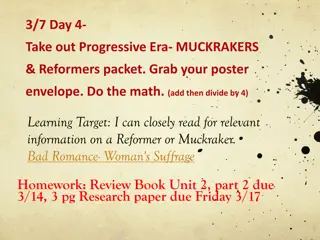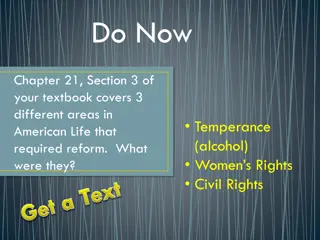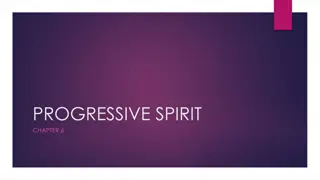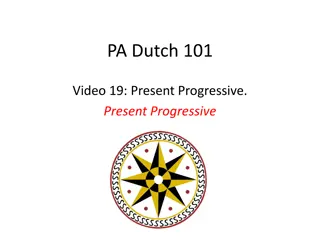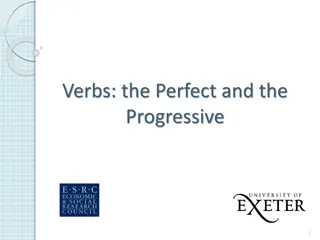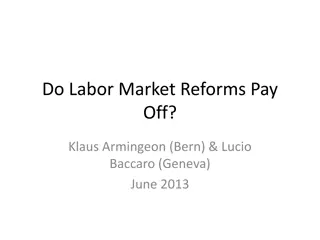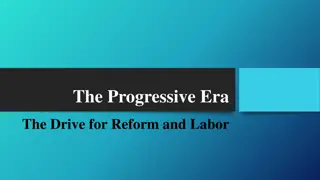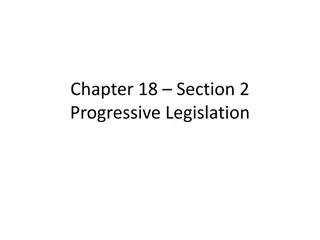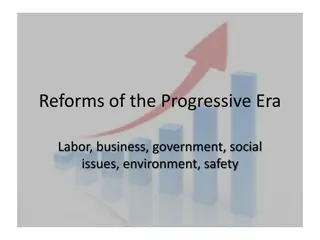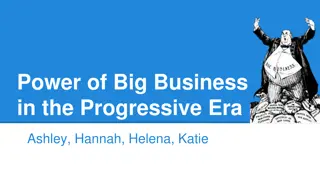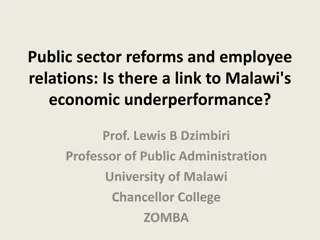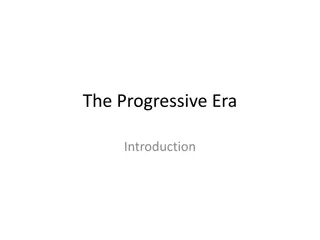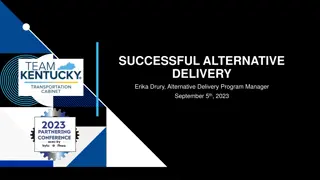Uncovering the Progressive Era: Muckrakers and Government Reforms
Journalists like Lincoln Steffens, Jacob Riis, Upton Sinclair, and Ida Tarbell played crucial roles during the Progressive Era by exposing political corruption, poor living conditions, and unfair business practices, leading to significant reforms in government and society.
Download Presentation

Please find below an Image/Link to download the presentation.
The content on the website is provided AS IS for your information and personal use only. It may not be sold, licensed, or shared on other websites without obtaining consent from the author. Download presentation by click this link. If you encounter any issues during the download, it is possible that the publisher has removed the file from their server.
E N D
Presentation Transcript
The Progressive Era The Muckrakers and Reforming Government
The Muckrakers During the Progressive Era, journalists and other writers began dramatizing the need for reform Their sensational reporting uncovered many ills afflicting America Theodore Roosevelt called these writers Muckrakers (writer who uncovers and exposes misconduct in politics or business) though Roosevelt agreed with much of what they said
Lincoln Steffens Lincoln Steffens- managing editor at McClure s magazine known for uncovering social problems 1903: published a collection of articles on political corruption Exposed how the government of Philadelphia allowed utility companies to charge customers high prices Showed how corrupt politicians won elections by bribing and threatening voters and how political corruption affected all aspects of life in the city
Jacob Riis Photographer for the New York Evening Sun Between 1890 and 1903 published several works including How the Other Half Lives Showed the crowded, unsafe, rat-infested, unsanitary living conditions of the urban poor Shocked the nation s conscience and led to reforms
Upton Sinclair Prolific American novelist and socialist Spent 7 weeks undercover working in a Chicago stockyard the result of which was the novel The Jungle Originally intended to raise sympathy for poor working conditions of immigrant workers Aroused widespread concerns about impurities in processing and packaging meat leading to regulations in the industry
Ida Tarbell Investigative journalist best known for her 1905 work The History of Standard Oil Company Became the most thorough account of the rise of business monopolies and the use of unfair practices
Reforming Government Progressives realized in order to reform society, they would need to reform the political process Wanted to free government from political bosses and powerful business interests Wanted to give the people more power over their government
Robert M. La Follette Progressives pushed for election reforms Traditionally, party leaders picked candidates for state and local offices Reform Wisconsin governor Robert M. La Follette established the direct primary (an election in which the citizens vote to select nominees for upcoming elections)
Reforming Government Progressives wanted to make sure elected officials would follow citizens wishes The worked for three other political reforms: The initiative- gave people the power to put a proposed new law on the ballot by collecting signatures The referendum- allowed citizens to approve or reject laws passed by a legislature The recall- gave voters the power to remove public servants from office before their terms ended
Government Reforms Business The Sherman Antitrust Act of 1890: first attempt by Congress to limit concentrations of power that interfere with trade and reduce economic competition Act was actually used to in corporations favor to claim labor unions were restraining trade Did begin a trend toward federal limitations on corporate power
Government Reforms Business The Clayton Antitrust Act- enacted by Congress in 1914 to clarify and strengthen the Sherman Antitrust Act Made practices that are conducive to the formation of a monopoly illegal Attempted to close the loopholes businesses used to create monopolies
Regulating Farming In 1867 Oliver H. Kelley organized the Grange- an organization with goals to teach new farming techniques and call for regulation of railroad and grain elevator rates In 1870s, Illinois, Wisconsin, and Minnesota enacted laws setting max rates on shipping freight and grain storage Although railroad challenged these Grange laws the Supreme Court upheld them
Populism Although the Grange began to decline in the late 1870s, farming protests continued Farmers began to form Alliances or Co-ops to band together and sell crops and push the prices of doing business down and the price of crops up Eventually the spread of Farming Alliances lead to the formation of the Populist Party
The Populist Party Populist Party or People s Party sought to build a new political party from the grass roots up Populist platform spoke out against political corruption, an inadequate monetary supply, and unresponsive government Wished to fight low prices with the coinage of silver and fight high costs with government ownership of the railroad
The Populist Party The Populist Party made some gains in the elections of 1892 and 1894 During the presidential election of 1896 the Populist Party made the decision to back William Jennings Bryan (Democrat) for president rather than nominate their own candidate When Bryan lost the election to William McKinley in 1896 the Populists lost a lot of support and eventually disappeared
